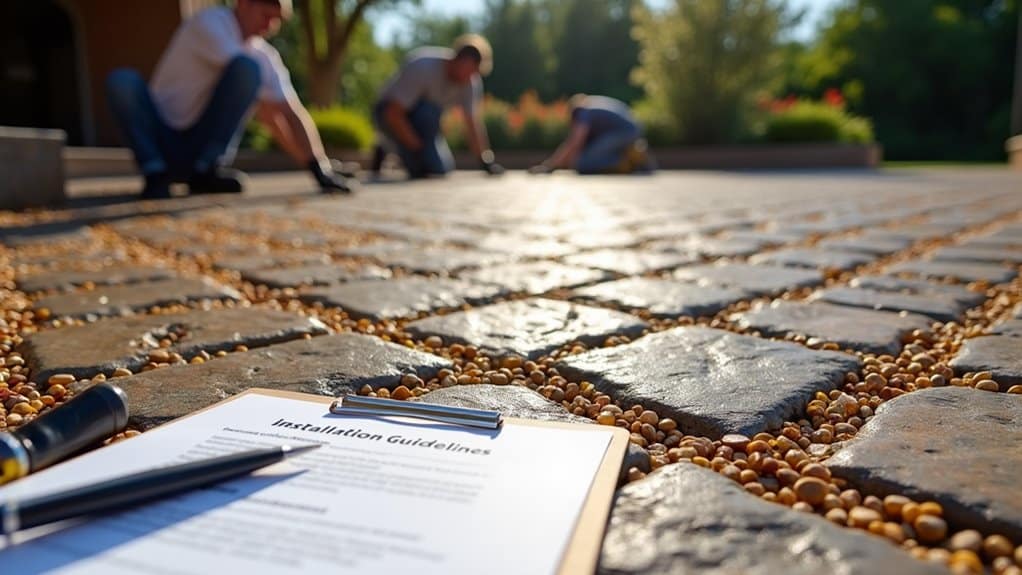Key regulations and standards for resin bound surfaces in the UK centre on crucial compliance areas. REACH regulations require specific diisocyanate training for installers, whilst SUDS compliance ensures proper drainage – particularly important given Britain's wet climate.
FeRFA guidelines set the benchmark for quality installation, including proper material selection and precise mixing ratios. For example, a typical mix ratio might be 6.5% resin to 93.5% aggregate, though this varies by system.
BBA certification offers peace of mind, confirming product durability through rigorous testing. Many councils and developers now require BBA-approved systems for public projects.
Regular training and compliance checks are essential. A quarterly audit of installation practices helps maintain standards and keeps teams up-to-date with industry developments. These measures ensure both quality and longevity in resin bound installations across the UK.
Key Takeaways
UK resin bound regulations are straightforward but essential to follow:
REACH training is now mandatory for anyone working with diisocyanates, with a firm deadline of 24 August 2023. Think of it as a driving licence for handling these materials – you simply can't work without it.
SUDS compliance isn't optional in Britain's wet climate. Your resin bound surface must handle our notorious weather, from heavy rain to frost, whilst allowing proper drainage.
Getting BBA approval is like having an MOT for building materials. It proves your resin bound system has been properly tested and won't let you down when installed correctly.
FeRFA guidelines are the industry's gold standard. They ensure installations meet proper quality levels through independent checks – much like having a building inspector approve your work.
Using recycled materials in resin bound surfaces isn't just good practice – it's becoming standard. Many contractors now use recycled glass and plastic aggregates, cutting waste whilst maintaining quality.
Key Regulations in Resin Bound Industry
Key Regulations in Resin Bound Industry
REACH regulations now require specific training for anyone working with products containing over 0.1% monomeric diisocyanates. All contractors must complete this training by 24 August 2023 to protect both workers and end users from potential health risks. This is part of the broader REACH regulation which aims to protect human health and the environment, ensuring that products meet modern safety standards for construction materials.
The British Board of Agrément (BBA) sets crucial quality standards for the industry. BBA approval means products have undergone thorough testing for performance and durability.
When choosing materials, look for BBA-approved options like Exo Supplies' resin to ensure quality.
Proper installation is equally critical. Resin bound systems need stable base surfaces and correct depth measurements to prevent cracking. This also ensures compliance with Sustainable Urban Drainage Systems (SUDS) requirements, which are particularly important for UK weather conditions and support the longevity and durability of the surface. Following these regulations not only keeps projects legal but also delivers better, safer results for everyone involved.
FeRFA's Role and Standards
FeRFA (The Resin Flooring Association) is the UK's leading body for resin flooring standards and quality control. Its core purpose is to maintain high industry standards through practical guidance and technical support. Members must follow strict quality guidelines, including:
- Regular quality assessments
- Adherence to established Codes of Practice
- Participation in training programmes, including NVQs
- Commitment to proper installation methods
The organisation's quality assurance scheme ensures members deliver consistent, high-quality work through independent assessments. This gives customers confidence when choosing FeRFA-approved contractors. Additionally, members are encouraged to use high-quality clear UV resistant resin to enhance the durability of their installations. Using durable materials contributes to the long-term performance of resin surfaces, benefiting both functionality and aesthetics.
Environmental responsibility is a key focus. Members must:
- Follow clear environmental policies
- Work towards zero waste through the FeRFA Recycling Scheme
- Comply with current environmental legislation
FeRFA provides comprehensive support through:
- Technical guidance documents
- Professional complaint handling
- Industry-specific training
- Regular updates on best practices
This structure helps maintain professional standards across the UK resin flooring industry, benefiting both contractors and customers.
Installation Guidelines and Best Practices

Understanding Resin Bound Regulations and Industry Standards
Essential Guidelines for Resin Bound Surface Installation
A successful resin bound installation depends on proper technique and thorough preparation. Following these key steps ensures optimal results:
- Base Requirements: Ensure a solid, stable and unified base, ideally using open grade tarmacadam or permeable concrete. Concrete base should be strong enough for the intended use to prevent future issues and drainage capacity is important to avoid water accumulation.
- Surface Preparation: Give the surface a thorough clean, making certain it's dry and free from debris. New or existing concrete surfaces must be primed before resin application, as this promotes better adhesion.
- Mixing Process: Mix resin and hardener at the specified ratio in a forced action mixer. Blend aggregates until stones are fully coated, with a standard 7.05% resin content to ensure a strong bind.
- Application Method: Apply the mixture evenly across the prepared surface at the correct depth. Level with a trowel or squeegee, then allow 24 hours for proper curing. Think of the base as the foundation of a house – get it right, and everything else follows.
These straightforward steps help avoid common installation pitfalls and ensure a durable finish.
Quality Assurance and Compliance
Quality assurance and compliance are essential for any resin bound installation in the UK. Proper quality control ensures your project meets industry standards and lasts for years to come. The FeRFA Codes of Practice set clear guidelines for best practice, much like a blueprint for success. Think of quality management systems as your daily checklist – they help maintain consistent standards throughout each project. Additionally, understanding the composition and structure of your materials can enhance the quality assurance process.
Regular compliance audits are crucial, working like an MOT for your processes. These checks ensure your materials meet REACH chemical safety regulations and other UK standards. Getting BBA approval for your materials proves they're fit for purpose, similar to having a product warranty. Additionally, being a member of FeRFA's governing body reinforces your commitment to maintaining high industry standards.
Keep all documentation readily available – particularly your BS EN UKAS ISO9001 certificates. Independent testing by UK laboratories backs up your quality claims. Following technical guidance, using quality aggregates, and mixing materials in the correct ratios leads to durable installations that meet British standards.
Remember:
- Document everything
- Test materials regularly
- Follow mixing ratios precisely
- Keep up with compliance checks
- Maintain BBA approval
This approach ensures your resin bound surfaces meet both legal requirements and customer expectations.
Sustainability and Material Benefits

Sustainability in resin bound surfaces delivers both environmental and practical benefits for UK properties. The use of these materials significantly reduces environmental impact whilst adding genuine value:
- Recycled Content: Uses crushed glass and recycled stones, cutting waste and preserving resources.
- Lower Carbon Impact: Manufacturing needs less energy than traditional surfacing methods. Additionally, incorporating recycled materials in the production process further improves sustainability.
- Natural Drainage: The porous surface allows rainwater to drain naturally, reducing flood risks – particularly valuable for British weather. This feature also promotes healthy soil and water ecosystems, enhancing the overall environmental quality.
- Built to Last: These surfaces typically last 20+ years, meaning fewer replacements and less waste. Their durability stands in contrast to many traditional surfaces that require frequent maintenance to avoid excessive runoff.
The system's eco-friendly packaging and disposal methods ensure your project meets current UK environmental standards.
Choosing resin bound surfaces means investing in sustainable development whilst getting a robust, low-maintenance solution that works well in British conditions.
Industry Development and Training
Industry Development and Training
The resin bound surfacing sector continues to grow across the UK, making proper training essential for industry professionals. Current market analysis shows significant expansion potential, requiring installers to maintain up-to-date knowledge and skills. The global resin market was valued at USD 556.00 billion in 2023, indicating the growing demand for skilled installers in this field. With our commitment to high-quality workmanship, Elite Resin Driveways and Patios ensures that our team is well-trained and knowledgeable in the latest techniques and materials.
Available training programmes:
| Training Programme | Key Features |
|---|---|
| Vuba Resin Bound Training | 1-day course covering installation basics |
| Theoretical & Practical | Personal coaching with hands-on sessions |
| Certification & Support | Certificate of competence included |
Training benefits include practical experience with mixing ratios and material selection – crucial skills for achieving durable, attractive installations. Common mistakes, such as incorrect aggregate blending or poor surface preparation, can be avoided through proper training. Most programmes combine classroom learning with hands-on practice, ensuring participants gain both theoretical knowledge and practical skills.
Regular training helps maintain high industry standards whilst improving job prospects in this expanding market. Many UK contractors now require certification as proof of competence, making training investment worthwhile for both newcomers and experienced installers.
Frequently Asked Questions
What Are the Costs Associated With Resin Bound Installations?
Material costs for resin bound installations typically range from £9 to £14 per square metre. Labour charges vary depending on the project's size and complexity, with rates differing across UK regions. A typical driveway installation in the South East, for instance, might cost more than a similar project in the North.
How Long Does Resin Bound Paving Last?
Resin bound paving typically lasts between 15-25 years when properly installed. Quality materials and expert fitting make all the difference – much like a well-built garden patio or driveway. A professionally installed resin surface can withstand British weather conditions, from harsh winters to summer heat, whilst maintaining its appearance and durability.
Can Resin Bound Surfaces Be Repaired if Damaged?
Resin bound surfaces can indeed be repaired when damaged. Quick repairs maintain the surface's quality and prevent costly problems down the line. Think of it like fixing a small chip in your car windscreen – sort it early to avoid bigger headaches later. Common fixes include patching up loose stones, filling small cracks or addressing worn patches, all of which help protect against water damage and keep the surface looking smart.
Are There Any Color Limitations for Resin Bound Systems?
Resin bound systems offer plenty of colour choices, but they do come with certain limitations. The choice of resin type affects which colours work best, and UV stability is particularly important in British weather. Darker shades like deep browns and greys tend to maintain their appearance longer than lighter colours, much like how garden furniture fades over time in direct sunlight. It's worth considering these factors when selecting colours for your driveway or patio to ensure long-lasting results.
What Maintenance Is Required for Resin Bound Surfaces?
Regular maintenance of resin bound surfaces is straightforward: sweep regularly to remove debris and pressure wash gently when needed. These simple steps keep the surface looking smart whilst preventing dirt build-up that could damage the resin over time. For best results, tackle any spills promptly and avoid harsh chemicals that might harm the surface.
Conclusion
Resin bound regulations and industry standards are vital for quality installations across the UK. Following established guidelines, such as those from British Standards Institution (BSI), ensures most projects meet required benchmarks for safety and longevity. Proper compliance not only protects your investment but also delivers reliable, weatherproof surfaces that last. Whether for driveways or commercial spaces, adherence to these standards helps create permeable surfaces that support sustainable drainage – a key requirement in many UK planning applications.
